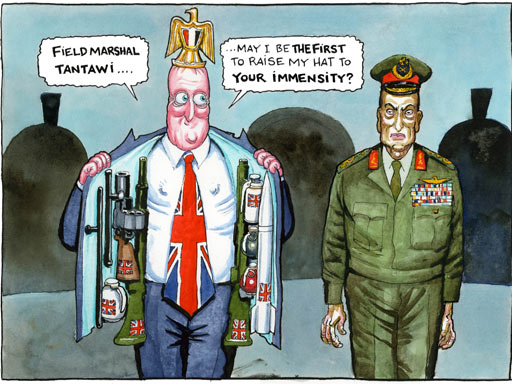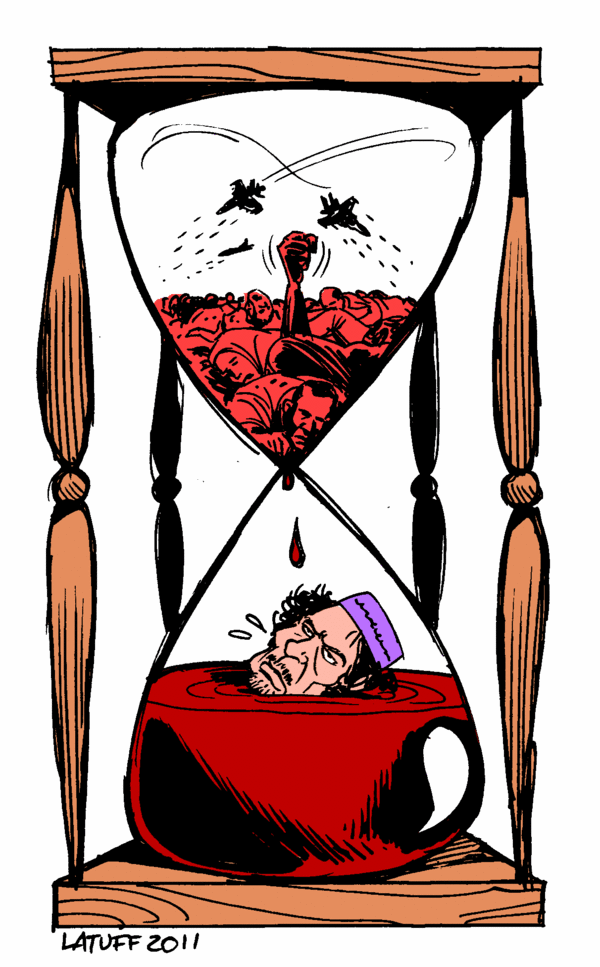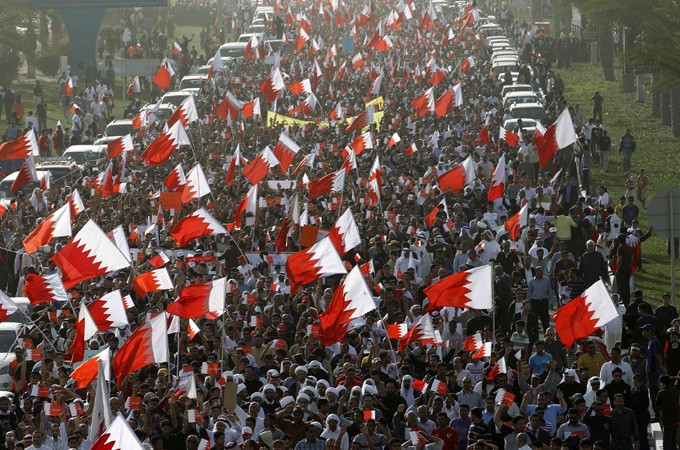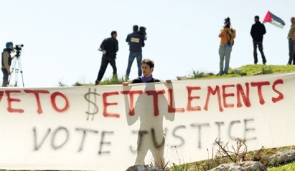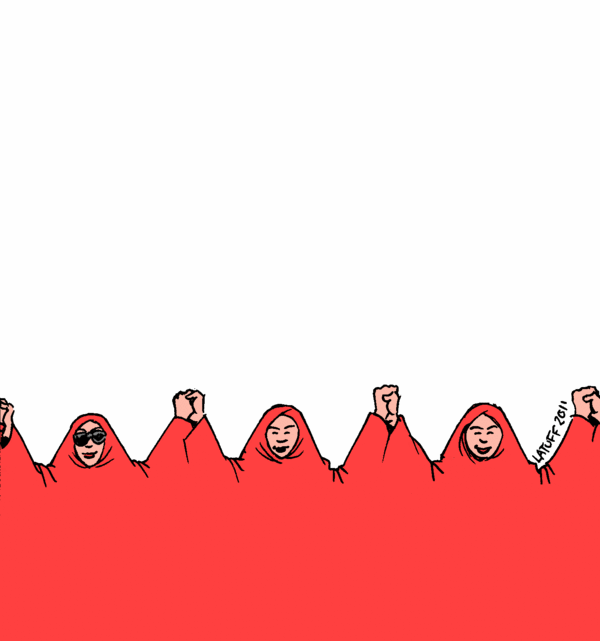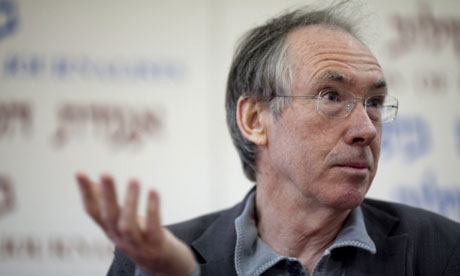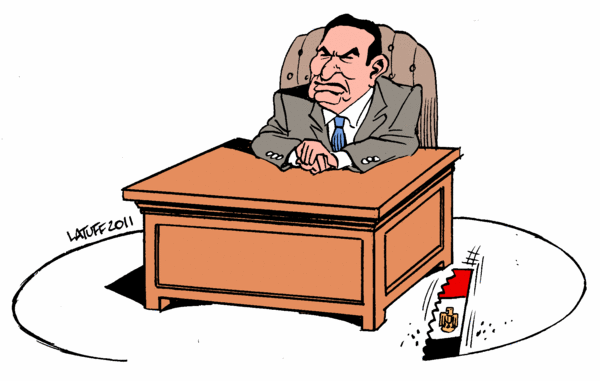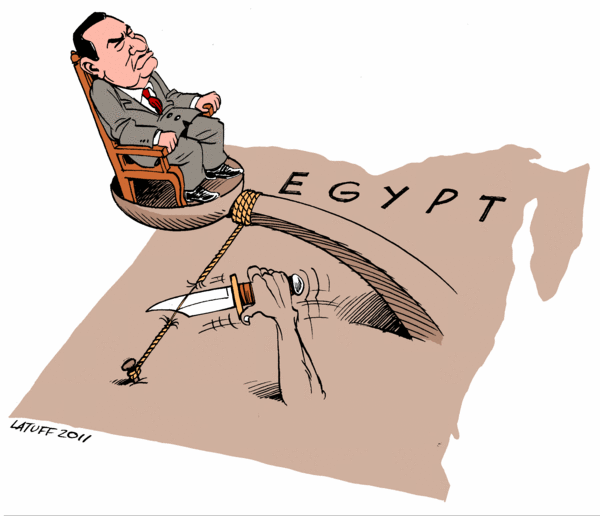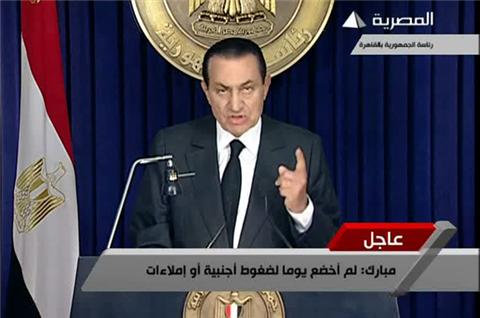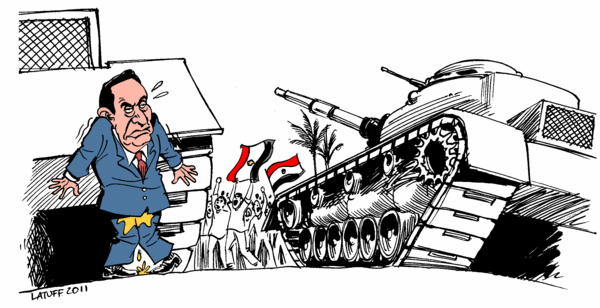EDITOR: The unbelievable has now happened
After 18 days of amazing and bloody struggle by millions of Egyptians, the fall of the Pharaoh, dictator for over three decades, has made millions of Egyptian happy beyond words, as well as many millions elsewhere. This is the end of the bloody chapter in the history of Egypt, the heart and soul of the Arab world. This will not only affect Egypt, but the whole Arab world.
The dictators and undemocratic regimes in the whole Middle East can now work out what will happen to them, following Tunisia and Egypt. The North African remaining tyrants should prepare their nests in Saudi Arabia, though how safe is that? Maybe Tel Aviv might be safer for ex-tyrants?
The leaders elsewhere are well advised to start working out their exit plans. Those depending on their secret and brutal police forces have only themselves to blame if their people start taking to the streets, which they surely will. The PA should be especially worried, in the wake of the Palestine Papers and the Egyptian Intifada, as should the other leaders east of Cairo.
The Tunisia and Egypt days of struggle have now brought a new force to the Middle East – people’s power. Those who are frightened of Arab democracy, such as the UK, US and Israel, should now think thrice before they support the remaining tyrants. People have long memories, and while the Egyptian Revolution was enacted without violence on the part of the the protesters, the incoming democratic government of Egypt is totally unlikely to continue the Mubarak policies and support Israel by joining its cruel blockade on Gaza, or its brutalities elsewhere in Palestine. The Israelis may well start working out how to continue living in the Middle East without killing thousands every year. It will be necessary for them in the near future.
As far as the US is concerned, this period has shown more than clearly the shallowness, stupidity and criminality of its policies in the Middle East. Will they change? Quite unlikely, I think. All the mistakes they have made in all parts of the world have never taught them anything, it seems; they just love to repeat the same mistakes in new locations.
The next weeks and months are going to be anything but simple or srtaight forward, for sure; despite the great difficulties still facing the young revolutions in Tunisia and Egypt, they are nonetheless likely to succeed in changing the narrative and socio-political discourse in the whole region. Those who lost their fear will find their power.
The 25th of January, 2011, will again be a historical date, a new beginning. Today we are all Egyptians!
• Egyptian president Hosni Mubarak has resigned
• Vice-president announces the army council holds power
• Cheers and fireworks as protests turn to celebrations
Egyptian anti-government protesters wave flags as they celebrate in Tahrir Square Photograph: Patrick Baz/AFP/Getty Images
6.50pm GMT: In this audio you can hear the emotion in the voice of veteran activist Ahmed Salah, as he shared what today means to him:
It brought tears to my eyes several times. I mean I have always had faith that we will win but this is remarkable. It’s like, how many days? We started on the 25th … and we won. That couldn’t have been imaginable just even a week ago, 10 days ago, that we will actually be free.
6.43pm GMT: More on vice president Joe Biden’s remarks on Egypt today:
This is a pivotal moment in history. This is a pivotal moment not just in Middle East history but in world history.
On Fox News though they have a different view. One presenter said it was the biggest event since “victory in Iraq”.
Carl Bernstein – the Watergate guy – says it’s on the scale of the fall of the Berlin Wall.
6.35pm GMT: The White House now says that Obama’s statement will take place at 3pm ET / 8pm GMT / 10pm EET.
6.29pm GMT: A spokesman for Egypt’s military has just appeared on television to read a new statement.
Read aloud in a flat monotone, the statement said that the supreme council of the armed forces was “currently studying the situation” and will issue further statements to clarify its position.
The military also had a farewell message for Mubarak:
“The supreme council of the armed forces is saluting President Hosni Mubarak for all he has given in sacrifice in times of war and peace.”
And it had kind words for the protesters:
“The supreme council of the armed forces is also saluting the spirits of those who were martyred.”
Note that the army’s statement made no mention of vice president Suleiman – interesting in the context of the Ahram Online report mentioned below. Further analysis of what this all means when we get the full text.
6.25pm GMT: The New York Times’s Lede blog alerts us to an intriguing report from Ahram Online, the English-language arm of the state newspaper Al Ahram, that “both of last night’s addresses by Mubarak and Suleiman were in defiance of the armed forces”:
Maj. Gen. Safwat El-Zayat, a former senior official of Egypt’s General Intelligence and member of the Egyptian Council of Foreign Affairs, asserted, in an interview with Ahram Online, that the address delivered by President Mubarak last night was formulated against the wishes of the armed forces, and away from their oversight. He claimed that Vice Preisdent Omar Suleiman’s address, which came on the heels of Mubarak’s address, was equally in defiance of the armed forces and away from its oversight.
El-Zayat said that represented a deep cleavage between the armed forces and the presidential authority of both Mubarak and Omar Suleiman.
6.18pm GMT: My colleague Hazem Balousha sends this from Gaza City:
Hamas is calling on people to rally tonight all over Gaza to celebrate the resignation of Hosni Mubarak and his regime. People are patrolling the streets and raising Egyptian flags. Some Hamas fighters have fired into the air since it was announced that Mubarak stepped down.
6.13pm GMT: The White House has announced that Barack Obama’s statement on Egypt, scheduled for 1.30pm ET (6.30pm GMT) has been delayed, and the venue has been switched from the press briefing room to the Grand Foyer as the administration prepares to ramp up Obama’s response.
This is Richard Adams in Washington DC taking over live blogging duties.
6.08pm: Here’s a video of the full statement from the vice president Omar Suleiman.
Turn off auto-refresh at the top of this page to watch the full video.
It’s fair to say he doesn’t look very happy.
6.00pm: It can’t be very often that Amnesty International is joining in the celebrations of an army taking power but this has not been an ordinary day. Secretary General Salil Shetty said:
I congratulate the protesters for their extraordinary courage and commitment to achieve fundamental change. Persistent attempts to put down peaceful protests have not only failed but redoubled the determination of those demanding change. The way Egyptians have taken to the streets in unprecedented numbers to demand dignity, human rights and social justice has been an inspiration to oppressed peoples everywhere.
The departure of one man is not the end. The repressive system that Egyptians have suffered under for three decades has not gone away and the State of Emergency remains in place. Those in power must grasp this opportunity to consign the systematic abuses of the past to history. Human rights reform must begin now.
5.58pm: Ian Black, the Guardian’s Middle East editor has been analysing what comes next.
On the army:
Rule by the military can only be temporary. Mubarak’s exit, the dissolution of what is seen as an illegitimate parliament, constitutional reforms and abolition of the emergency laws are all non-negotiable. If those reforms are achieved then Egypt will have witnessed a real revolution – beyond the removal of a stubborn 82-year-old president long past his sell-by date.
It seems clear from the events of recent days – especially the confusion and contradictory messages on Thursday — that the army is divided. If it moves solely to protect its own privileged position, and that of the big businessmen who have done so well out of their links with the regime – then the system will not open up, at least not without large-scale repression and bloodshed.
On the implications for the wider Middle East:
Egypt’s extraordinary change matters first for Egypt’s 82m people. But what happens in the Arab world’s most populous country matters for many millions of other Arabs, who also suffer from unemployment, inequality, corruption and unresponsive, unaccountable governments – and share the language in which it is being covered in media such as al-Jazeera and social networking sites that official censors cannot easily block.
Other authoritarian regimes, shocked first by the uprising in Tunisia and now in Egypt, have been trying to pre-empt trouble by promises of reform, sacking ministers, maintaining subsidies or raising wages to buy off critics and defuse tensions. The symptoms are visible from Yemen to Jordan, from Algeria to Syria.
On the implications for the US:
Egypt remains a vital asset in allowing US military overflights, as the guardian of the strategically vital Suez canal, and a loyal ally in the regional confrontation with Iran. Mubarak has played a key role in supporting the western-backed Palestinian Authority and containing the Islamist movement Hamas in the Gaza Strip, not least because of its affinity with the banned Muslim Brotherhood – whose likely future role in a freer Egyptian political system is a key and much-discussed issue both at home and abroad.
The events of the last 18 days have forced Obama to shift away from stability to embracing if not promoting democracy – to the evident discomfort of other conservative Arab friends, especially the Saudis. Jordan and Yemen share those concerns – fearing that unconditional US support for them may now also wane.
This is a picture from yesterday when anti-government protesters in Tahrir Square shouted in anger after the first by Egyptian president Hosni Mubarak. Photograph: Chris Hondros/Getty Images
5.54pm: Joe Biden, the US vice president, who initially defended Mubarak, saying he was not a dictator and should not stand down, said: “This is a pivotal moment in history… the transition that’s taking place must be an irreversible change”
There has been reaction from other leaders.
The British prime minister David Cameron called for a move to “a move to civilian and democratic rule” . He said the departure of Mubarak offered Egypt a “really precious moment of opportunity”. Speaking on the steps of No 10, he said the new government should start to put in place “the building blocks of a truly open, free and democratic society”.
German chancellor Angela Merkel, said: “Today is a day of great joy. We are all witness to historic change. I share the joy of people on the streets of Egypt.”
5.49pm: The Nobel peace prize winner and Egyptian opposition figure Mohamed El Baradei has been talking to Al Jazeera in the last half and hour.
“This is the emancipation of Egypt. This is the liberation of the Egyptian people,” he said in a phone interview with the broadcaster’s English-language news channel. “It’s a dream come true,” said El Baradei, who added that it was the Egyptian people who had been able to restore their “humanity and independence.
Asked what happens next, he replied: “What I have been talking about and proposing is a transition period of one year. We would have a provisional council, a transition government, preferably a provisional council including a person from the army and civilians, but the main idea would be that the army and the people would work together for a year up to the point where we could have a free and fair election.”
He said his message to the Egyptian people was: “You have gained your liberty, you have gained the right to catch up with the rest of the world. Make the best use of it you can and God bless you.”
5.48pm: There has s been a jubilant response in Lebanon and Tunisia, the Associated Press reports:
Moments after Egypt’s vice president Omar Suleiman made the announcement of Mubarak’s resignation, fireworks lit up the sky over Beirut. Celebratory gunfire rang out in the Shiite-dominated areas in south Lebanon and in southern Beirut.
On Al-Manar TV, the station run by the Shiite Muslim Hezbollah faction, Egyptian anchor Amr Nassef, who was once imprisoned in Egypt for alleged ties to Islamists, cried emotionally on the air and said: “Allahu Akbar (God is great), the Pharaoh is dead. Am I dreaming? I’m afraid to be dreaming.”
In Tunisia, where a successful uprising expelled a longtime leader only weeks earlier, cries of joy and the thundering honking of horns greeted the announcement. “God delivered our Egyptian brothers from this dictator,” said Yacoub Youssef, one of those celebrating in the capital of Tunis.
5.47pm: Amr Mousa, an Egyptian, and the secretary general of the Arab League, who has previously hinted that might stand for presidency, has given his reaction:
I look forward to the future to build a ntional consensus in the coming period. There is a big chance now and a window has opened after this white revolution and after the president’s concession.
Asked if he was interested in being president, he said: “This is not the time to talk about that … As an Egyptian citizen, I am proud to serve my country with all the others at this stage, to build a consensus of opinion.”
5.46pm: Our political correspondent Allegra Stratton says the UK has already been considering the prospect of an asylum application from Mubarak:
The UK’s national security council (NSC) has considered what happens if Hosni, his wife Suzanne or or their son Gamal Mubarak, indeed any of the president’s family, would like asylum in the UK. Remember Gamal has a five-storey house in Knightsbridge.
A government source says that the Foreign Office is aware that the UK’s government’s new position on the middle east – hands off, welcoming of change – would be troubled if the UK were to also grant any asylum requests to Mubaraks or indeed other deposed Arab leaders.
The text from the NSC meeting, held last week, says: “The NSC is working on predicting where and when events might occur next. There is a low risk that former heads of state and members of regimes might seek refuge here. Many have the documentation and money to get here, and some will have links to the UK. Each request will be considered, in consultation between the Home Office and Foreign Office, on a case by case basis.”
So, cautious language, but the source says they are thinking about what their position will be as and when any request comes through. There will be a question mark over exactly what the FCO and Home office could do given Suzanne was born in Wales and is thought to have British citizenship.
5.42pm: In what has turned out to be a momentous day, here is a summary of events.
President Hosni Mubarak has resigned and handed over power to the army. His vice president, Omar Suleiman, said in a short TV address: “In these difficult circumstances that the country is passing through, President Hosni Mubarak has decided to leave the position of the presidency. He has commissioned the armed forces council to direct the issues of the state.”
Protests turned to celebrations around Egypt. “Cairo erupts in celebration as 18 days of defiant protest finally delivers a revolution after 24 hours of euphoria, dashed hopes and victory,” our correspondent Chris McGreal wrote from outside the state TV centre. “There was a complete eruption of humanity, I have never seen anything like it. The world’s biggest street party has really kicked off here,” said Jack Shenker from outside the presidential palace.
But there are still questions over what happens next. The army is now in charge and it has yet to make its intentions clear.
Protesters celebrate President Hosni Mubarak’s resignation. Photograph: Suhaib Salem/Reuters
5.28pm: Our correspondent Chris McGreal was outside the Egyptian state TV building when the historic announcement was made. In this audio report, he says:
They were completely stunned. When this very brief announcement came from the vice president Omar Suleiman, he simply said “Mubark’s gone”, there was a a pause. Then a ripple went through the crowd and they went wild. Some fell onto their knees praying, people were weeping instantly. They were hugging each other, chanting in unison, “Mubarak’s gone”, words to that effect. There was joy, euphoria, call it what you want. I think people couldn’t quite grasp that this revolution that they’d led fro 18 days had finally delivered.
But Chris warns there will now be close scrutiny of the army:
Of course there will be a sobering up. Not many people are thinking of what the military role means and of course once the military is in the saddle so to speak, people will be looking to it to actually deliver. They will be wanting to see, for instance, the dissolution of parliament, the lifting of the state of emergency, all the kind of things they have been demanding as well as Mubarak’s resignation. I think they’re feeling newly empowered, I think people realise the can hold parliament to account of bring it down and if it’s seen to be not delivering they may well be back out on the streets.
5.20pm: There are reports that the Egyptian army is to make another statement soon.
5.19pm: Nicholas Kristof, the New York Times Pulitzer prize-winning journalist, has been quick to instill a note of caution:
But the game isn’t over, and now a word of caution. I worry that senior generals may want to keep (with some changes) a Mubarak-style government without Mubarak. In essence the regime may have decided that Mubarak had become a liability and thrown him overboard — without any intention of instituting the kind of broad, meaningful democracy that the public wants.
Senior generals have enriched themselves and have a stake in a political and economic structure that is profoundly unfair and oppressive. And remember that the military running things directly really isn’t that different from what has been happening: Mubarak’s government was a largely military regime (in civilian clothes) even before this. Mubarak, Vice President Suleiman and so many others — including nearly all the governors — are career military men. So if the military now takes over, how different is it?
Massive crowd in Cairo square at center of protests explodes with joy following announcement by Vice President Omar Suleiman.
Egyptian President Hosni Mubarak stepped down Friday after 30 years as president and handed control to the military, bowing down to an historic 18-day wave of pro-democracy demonstrations by hundreds of thousands.
The massive crowd in Cairo’s central Tahrir Square exploded with joy, embracing, weeping and waving Egyptian flags, and car horns and celebratory shots in the air were heard around the city of 18 million in joy after Egyptian Vice President Omar Suleiman made the announcement on national TV just after nightfall.
The people have brought down the regime,” chanted the crowds in the square.
“In these grave circumstances that the country is passing through, President Hosni Mubarak has decided to leave his position as president of the republic,” said a somber Suleiman. “He has mandated the Armed Forces Supreme Council to run the state. God is our protector and succor.”
Nobel Peace laureate Mohammed ElBaradei, whose young supporters were among the organizers of the protest movement, told The Associated Press: “This is the greatest day of my life.”
“The country has been liberated after decades of repression,” he said, adding that he expects a beautiful transition of power.
A senior member of the Muslim Brotherhood, Egypt’s biggest opposition group, said Egyptians had achieved the main goal of their popular uprising after Mubarak’s resignation.
“I salute the Egyptian people and the martyrs. This is the day of victory for the Egyptian people. The main goal of the revolution has been achieved,” Mohamed el-Katatni, former leader of the Brotherhood’s parliamentary bloc, told Reuters.
Katatni said the Brotherhood awaits the next steps to be taken by the Higher Military Council, which has taken charge of the country’s affairs after Mubarak’s decision.
Earlier in the day, a ruling partly official reported that Mubarak and his family left Cairo for the Red Sea resort of Sharm el-Sheikh, proving he is giving up his presidential powers.
Protesters seeking Mubarak’s overthrow moved overnight to the Ittihadiya presidential palace in the Cairo suburb of Heliopolis for the first time since demonstrations began on Jan. 25.
EDITOR: The final stage of the revolution seems to be here! (those lines were written in the early morning…)
In another facile speech, Mubarak has clarified beyond any doubt, that he is not in touch with reality. Omar Suleiman, his sidekick and servile deputy, is not much more connected either. Both seem to think that they can spout more lies and get the demonstrators home, and continue with their corrupt regime, by promising democracy by September. The Egyptian people know – it is now or never!
Meanwhile, on the farm in Washington, the animals are in disarray… not quite decided if they prefer democracy to ‘stability’ they keep swivelling like a weather-vane gone out of control. It seems that Obama is listening to both sides, and keeps changing his mind on a daily basis. Two things are now clear:
1. The US administration is not well-informed (they don’t seem to have Al Jazeera on the White House channels…) and is not clear about what is happening in Egypt. This may sound incredible, but there is no other expalnation to their bizarre switching of policy.
2. The US administration is also not clear and have not decided what they want out of this situation – do they prefer to see the dictator continue and choke the Egyptian people, or do they risk allowing democracy in Egypt to develop? The choice is difficult for a governemnt which has supported dictators and and brutal occupations as far as memory goes, and not just in the Middle East. Do they want ‘stability’, or do they want to foment unrest and be the arbiter?
This situation is most dangerous for the whole Middle East, now moving at enormous speed to modernise and democratise, after decades of corrupt and brutal regimes. In the end, the US seems just as confused as Mubarak about the direction of events.
All over Egypt, the millions are now rising without fear, witha single voice. We have just heard that Mubarak and his family has run away, apparently to Sharm El Sheikh. Well, it is not far from there to Saudi Arabia. The revolution is on its to victory.
Al Arabiya says beleaguered Egyptian president leaves for Sinai of Sharm el-Sheikh as protesters call on the military to take action to push Mubarak out.
The Al Arabiya report came as Egypt’s powerful military backed Mubarak’s plan to stay in office until September elections earlier Friday, enraging hundreds of thousands of protesters who deluged the squares of Cairo and Alexandria and marched on presidential palaces and state television – key symbols of the authoritarian regime.
The army’s show of solidarity with the president was a heavy blow to protesters who called on the military to take action to push Mubarak out after he announced Thursday night that he would hand most of his powers to Vice President Omar Suleiman but remain in office.
The Armed Forces Supreme Council, the military’s highest body, depicted itself as the champion of reform in its latest statement. Trying to win the trust of an angry and skeptical population, the army promised to make sure Mubarak lifts hated emergency laws immediately once protests end. Mubarak and Suleiman had only given a vague timetable for ending the law – when security permits.
Still, the profound disappointment that Mubarak did not step down on Thursday turned to rage on Friday and protests escalated.
“What are you waiting for?” one protester yelled in the face of an army officer outside Mubarak’s main palace, Oruba, in northern Cairo, where a crowd of demonstrators grew to more than 2,500. “Did you pledge your allegiance to the president or the people?” another shouted.
It was not known if Mubarak was in the palace, one of at least three in Cairo, or even in the capital. The palace was protected by four tanks and rolls of barbed wire, but soldiers did nothing to stop more people from joining the rally.
The march on the palace were the first by protesters who for nearly three weeks have centered their mass demonstrations in Cairo’s downtown Tahrir Square.
More than 10,000 tore apart military barricades in front of the towering State Television and Radio building, a pro-Mubarak bastion that has aired constant commentary supporting him and dismissing the protests. They swarmed on the Nile River corniche at the foot of the building, beating drums and chanting, Leave! Leave! Leave! They blocked employees from entering, vowing to silence the broadcast.
Soldiers in tanks in front of the building did nothing to stop them, though state TV continued to air.
Pro-democracy campaigners march on state television and presidential palaces, as army calls for normal life to resume
Massive crowds have gathered across Egypt, including hundreds of thousands of protesters in and around Cairo’s Tahrir [Liberation] Square, calling for Hosni Mubarak, the Egyptian president, to stand down.
Pro-democracy activists in the Egyptian capital marched on the presidential palace and state television buildings, while many also gathered at Liberation Square, on Friday, the 18th consecutive day of protests.
At the state television building, thousands have blocked people from entering or leaving, accusing the broadcaster of supporting the current government and of not truthfully reporting on protests.
“The military has stood aside and people are flooding through [a gap where barbed wire has been moved aside],” Al Jazeera’s correspondent at the state television building reported.
He said it was not clear if they planned to storm the building, but said that “a lot of anger [was] generated” after Mubarak’s speech last night, where he repeated his vow to complete his term as president.
“The activity isn’t calm, but there are a lot of people here who are tired of not having their demands met,” he said.
Outside one presidential palace where protesters had gathered in Cairo, our correspondent reported that there was a strong military presence, but that there was “no indication that the military wants to crack down on protesters … in Cairo”.
She said that army officers had engaged in dialogue with protesters, and that remarks had been largely “friendly”.
Tanks and military personnel had been deployed to bolster barricades around the palace.
Reports indicate, however, that Mubarak and his family have left Cairo, bound for an as yet unconfirmed destination, though Mohammed Abdellah, a spokesman of Mubarak’s National Democratic Party, told the AFP news agency that the president was bound for his residence at the Red Sea resort of Sharm al-Shaikh.
In Tahrir Square, meanwhile, hundreds of thousands of protesters gathered, chanting slogans against Mubarak and calling for the military to join them in their demands.
Our correspondent at the square said the “masses” of pro-democracy campaigners there appeared to have “clear resolution” and “bigger resolve” to achieve their goals than ever before.
He also said, however, that protesters were “confused by mixed messages” coming from the army, which has at times told them that their demands will be met, yet in communiques and other statements supported Mubarak’s staying in power until at least September.
Army statement
In a statement read out on state television at midday, the military announced that it would lift a 30-year-old emergency law but only “as soon as the current circumstances end”.
The military said it would also guarantee changes to the constitution as well as a free and fair election, and it called for normal business activity to resume.
Many protesters, hoping for Mubarak’s resignation, had anticipated a much stronger statement.
Al Jazeera’s correspondent in Tahrir Square said people there were hugely disappointed and vowed to take the protests to “a last and final stage”.
“They’re frustrated, they’re angry, and they say protests need to go beyond Liberation [Tahrir] Square, to the doorstep of political institutions,” she said.
Protest organisers have called for 20 million people to come out on “Farewell Friday” in a final attempt to force Mubarak to step down.
‘Anything can happen’
Hossam El Hamalawy, a pro-democracy organiser and member of the Socialist Studies Centre, said protesters were heading towards the presidential palace from multiple directions, calling on the army to side with them and remove Mubarak.
“People are extremely angry after yesterday’s speech,” he told Al Jazeera. “Anything can happen at the moment. There is self-restraint all over but at the same time I honestly can’t tell you what the next step will be … At this time, we don’t trust them [the army commanders] at all.”
An Al Jazeera reporter overlooking Tahrir said the side streets leading into the square were filling up with crowds.
“It’s an incredible scene. From what I can judge, there are more people here today than yesterday night,” she said.
“The military has not gone into the square except some top commanders, one asking people to go home …I don’t see any kind of tensions between the people and the army but all of this might change very soon if the army is seen as not being on the side of the people.”
Hundreds of thousands were participating in Friday prayers outside a mosque in downtown Alexandria, Egypt’s second biggest city.
Thousands of pro-democracy campaigners also gathered outside a presidential palace in Alexandria.
Egyptian television reported that large angry crowds were heading from Giza, adjacent to Cairo, towards Tahrir Square and some would march on the presidential palace.
Protests are also being held in the cities of Mahala, Tanta, Ismailia, and Suez, with thousands in attendance.
In a televised address to the nation on Thursday, Mubarak said he was handing “the functions of the president” to Vice-President Omar Suleiman. But the move means he retains his title of president.
“I have decided to stick… by my responsibility in protecting the constitution and the people’s interests until the power and responsibility are handed over to whomever the voters chose next September, in free and fair elections,” the president said.
Halfway through his much-awaited speech late at night, anticipation turned into anger among protesters camped in Tahrir Square who began taking off their shoes and waving them in the air.
‘Go home’
Immediately after Mubarak’s speech, Suleiman called on the protesters to “go home” and asked Egyptians to “unite and look to the future.”
“Youth of Egypt, heroes of Egypt, go back to your homes and businesses. The country needs you so that we build, develop and create,” Suleiman said.
“Do not listen to tendentious radios and satellite televisions which have no aim but ignite disorder, weaken Egypt and distort its image.”
More than 1,000 protesters moved overnight towards the presidential palace in the upscale neighbourhood of Heliopolis in central Cairo.
Union workers have joined the protests over the past few days, effectively crippling transportation and several industries, and dealing a sharper blow to Mubarak’s embattled regime.
The US and EU said the announcement to transfer some powers to the vice-president was grossly insufficient and falls short of genuine reforms demanded by the people.
“The Egyptian people have been told that there was a transition of authority, but it is not yet clear that this transition is immediate, meaningful or sufficient,” Barack Obama, the US president, said in a statement

